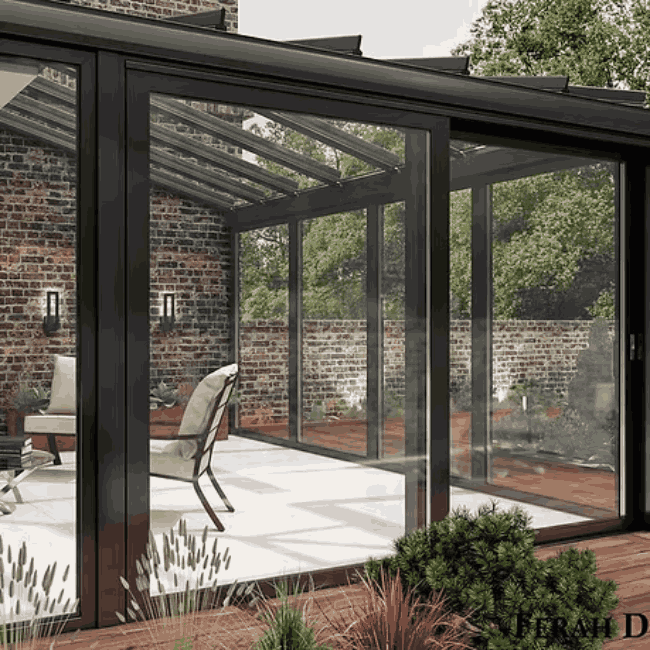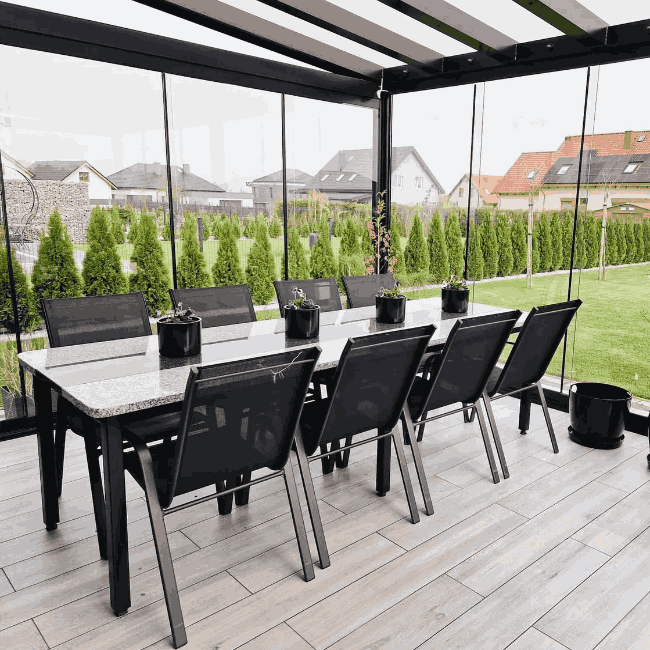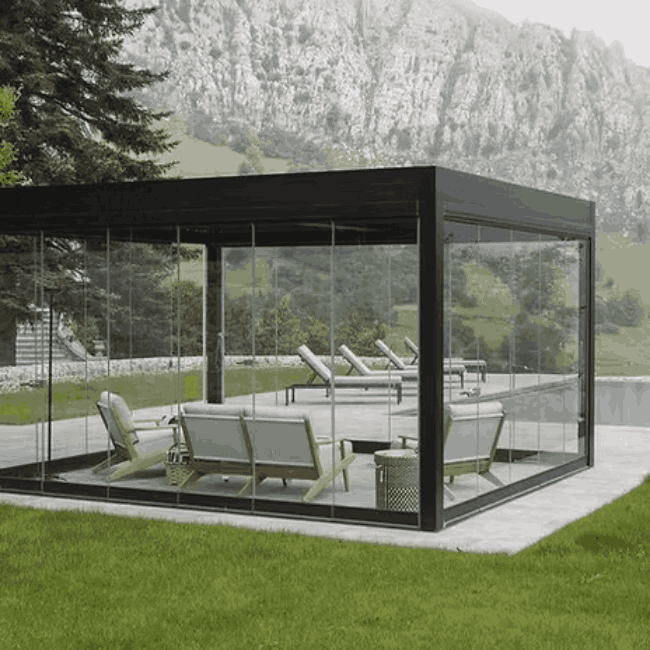Discover the benefits, features, usage areas, and prices of Winter Garden. Learn why installing a high-quality, waterproof, and versatile Winter Garden is ideal
| Products | Size | Price | Material |
|---|---|---|---|
| Pergola | Under 10m² | 110 € | Motorized |
| Awning | Above 20m² | 110 € | Motorized |
| Zip Curtain | 9m² | 900 € | Local Fabric |
| Bioclimatic Pergola (Piston) | Under 20m² | 350 € | Motorized |
| Rolling Roof (Scissor) | Above 25m² | 300 € | Motorized |
| Glass Ceiling | Under 10m² | 250 € | - |
| Winter Garden | Under 10m² | 300 € | Motorized |
| Aluminum Ceiling | Above 20m² | 350 € | Motorized |
| Heat Glass Sliding | Under 10m² | 110 € | - |
| Sliding Glass | Above 10m² | 110 € | - |
| Guillotine Glass | Unit | 65 € | Motorized |
| Double Opening Awning | Above 20m² | 110 € | Motorized |
| Single Carport | - | 6500 € | Motorized |
| Double Carport | - | 8500 € | Motorized |
| Bioclimatic Ceiling | Under 10m² | 350 € | Motorized |
| Terrace Roof Pergola | Under 10m² | 65 € | Motorized |
What is a Winter Garden?
A Winter Garden is an architectural structure designed to provide a comfortable indoor environment that bridges the gap between indoor and outdoor living spaces. Often built with large glass panels, it allows natural light to flood in while protecting occupants from harsh weather conditions, including cold winter winds, rain, and snow. This unique space functions as a sunroom, conservatory, or greenhouse, depending on the design, and can be integrated seamlessly with homes, commercial buildings, and hotels. Its primary goal is to create a year-round usable space that maintains a connection to nature without compromising comfort. Beyond aesthetics, a winter garden enhances property value, provides space for plants, relaxation, and social gatherings, and creates an energy-efficient environment by utilizing passive solar heating.

What is a Winter Garden and What is it Used For?
A Winter Garden serves multiple purposes, combining functionality, comfort, and aesthetics. Traditionally, it was used as a protected greenhouse for plants during colder months, but modern applications have expanded. Today, winter gardens act as relaxation zones, home offices, dining areas, or social spaces, offering panoramic views while sheltering occupants from weather extremes. They are perfect for hosting small gatherings, reading, or enjoying a cup of tea while feeling immersed in nature. In commercial settings, winter gardens can increase foot traffic and customer satisfaction in restaurants, hotels, and shopping complexes. The key to their versatility lies in their ability to blend indoor and outdoor experiences, maximizing sunlight, reducing heating costs, and creating an elegant ambiance.

What are Winter Garden Models?
Winter Gardens come in various models and designs, each catering to different architectural needs and aesthetic preferences:
-
Classic Glass Winter Garden: Full glass walls and roof for maximum light.
-
Bioclimatic Winter Garden: Adjustable louvers or panels that control airflow, temperature, and sunlight exposure.
-
Aluminum Frame Winter Garden: Durable, low-maintenance structure suitable for modern homes.
-
Wooden Winter Garden: Traditional, warm aesthetic that blends with natural surroundings.
-
Retractable Winter Garden: Roofs or panels that open for ventilation during mild weather.
-
Modular Winter Garden: Flexible components that can be expanded or reduced as needed.
Each model varies in price, insulation capacity, and ease of installation, allowing homeowners or businesses to choose a solution that fits their lifestyle and environment.

What are the Features of a Winter Garden?
Winter Gardens are defined by several key features that distinguish them from ordinary extensions or glass rooms:
-
Thermal Insulation: Double or triple-glass panels maintain temperature balance.
-
UV Protection: Specialized coatings prevent sun damage to furniture and plants.
-
Ventilation Options: Automated or manual systems ensure optimal airflow.
-
Structural Durability: Aluminum, wood, or steel frames support both aesthetics and strength.
-
Customizable Designs: Shapes, sizes, and finishes can be adapted to suit home architecture.
-
Smart Technology Integration: Automated shading, heating, and lighting systems enhance comfort.
-
Plant-Friendly Environments: Controlled humidity and light for greenery all year.
These features ensure that the winter garden is not only a beautiful addition but also a practical and functional living space.

What are the Differences Between a Bioclimatic and a Winter Garden?
While both provide indoor-outdoor living experiences, there are important differences:
-
Winter Garden: Primarily a fixed, glass-enclosed space offering protection from cold and rain.
-
Bioclimatic Winter Garden: Integrates adjustable louvers or roof panels, allowing control over sunlight, temperature, and ventilation. It adapts dynamically to weather changes, offering energy savings and enhanced comfort.
-
Energy Efficiency: Bioclimatic designs use natural ventilation and shading to reduce energy consumption, while traditional winter gardens rely more on heating systems.
-
Flexibility: Bioclimatic pergola systems can transform spaces according to the season, making them more versatile than standard winter gardens.
Understanding these distinctions helps homeowners and businesses make informed decisions based on climate, usage, and budget.

Is It Advantageous to Have a Winter Garden Built?
Building a winter garden has multiple advantages:
-
Extended Living Space: Adds usable square meters without full-scale construction.
-
Property Value: Increases both aesthetic appeal and real estate value.
-
Energy Efficiency: Maximizes natural light and reduces heating costs during winter.
-
Health & Wellness: Provides a sunny, nature-connected environment for relaxation and mental wellbeing.
-
Versatility: Serves as a dining area, office, greenhouse, or leisure room.
-
Year-Round Enjoyment: Offers outdoor ambiance regardless of season or weather conditions.
The investment not only enhances the home’s functionality but also creates a unique lifestyle experience.

What is a Bioclimatic Winter Garden System?
A Bioclimatic Winter Garden System is an advanced, adaptive structure designed for comfort, efficiency, and sustainability. It integrates:
-
Adjustable Roof Louvers: Automatically control sunlight and shade.
-
Smart Ventilation: Maintains optimal indoor climate.
-
Energy Savings: Reduces reliance on artificial heating and cooling.
-
Durable Materials: Aluminum and high-quality glass withstand weather fluctuations.
-
Custom Automation: Allows remote control through apps or smart home systems.
This system merges the luxury of a winter garden with modern environmental technology, providing a dynamic living space that adapts to every season.

Winter Garden… But Which Brand? / Highlight Our Winter Garden Company
Choosing the right winter garden brand is crucial. Quality, service, and reliability differentiate providers. Our company focuses on:
-
Custom Design Solutions: Tailored to your home and lifestyle.
-
High-Quality Materials: Aluminum, tempered glass, and weather-resistant components.
-
Expert Installation: Ensures safety, durability, and aesthetics.
-
After-Sales Support: Maintenance, repairs, and upgrades.
-
Local Expertise: Understanding Turkey’s climate and regulations for optimal performance.
Investing in a reputable brand guarantees both peace of mind and a long-lasting structure.

Winter Garden System Manufacturers in Turkey
Turkey has a growing market of winter garden manufacturers, offering:
-
Diverse Materials: Aluminum, wood, steel.
-
Advanced Technology: Bioclimatic systems with automation.
-
Tailored Solutions: Residential, commercial, and luxury projects.
-
Regulatory Compliance: Designs suited for seismic and weather requirements.
-
Competitive Pricing: Options for various budgets without sacrificing quality.
Selecting the right manufacturer ensures both the structural integrity and aesthetic appeal of your winter garden.

Winter Garden… But Which One Should I Choose?
The right winter garden depends on:
-
Purpose: Dining area, office, greenhouse, or leisure space.
-
Climate: Traditional vs. bioclimatic systems for local weather.
-
Budget: Material, size, and automation options.
-
Aesthetics: Modern aluminum or warm wooden styles.
-
Maintenance Needs: Ease of cleaning and durability.
-
Future Expansion: Modular designs for adaptability.
By evaluating these factors, you can create a winter garden that enhances your lifestyle, energy efficiency, and property value.

Is a Winter Garden Waterproof?
A Winter Garden is designed to protect against all weather conditions, but its waterproofing depends on the materials, design, and installation quality. High-quality systems use tempered glass panels, aluminum or steel frames, and sealed joints to prevent leaks and water ingress. Waterproofing is essential not only to protect furniture and indoor plants but also to maintain structural integrity over time.
-
Sealing Systems: Modern winter gardens often include silicone or EPDM rubber seals along joints and glass panels, ensuring no water enters even during heavy rain or snow.
-
Roof Design: Sloped or bioclimatic roofs allow rainwater to flow naturally into gutters, preventing pooling and leaks.
-
Frame Materials: Aluminum and coated steel are resistant to corrosion and water damage, while wooden frames must be treated for waterproofing.
Ultimately, a properly installed winter garden is completely waterproof, but it requires attention to design, materials, and ongoing maintenance to ensure long-term reliability.

Winter Garden Manufacturers… But Which One? Highlight Us as an Istanbul Company
Choosing the right winter garden manufacturer is critical for quality, durability, and aesthetics. Our Istanbul-based company specializes in custom winter garden systems that combine luxury, durability, and cutting-edge technology.
Key reasons to consider a trusted manufacturer:
-
Customized Designs: Tailored to your building’s architecture and your personal needs.
-
High-Quality Materials: Aluminum frames, laminated or tempered glass, and waterproof seals.
-
Expert Installation: Ensures safety, stability, and perfect alignment of panels.
-
After-Sales Support: Maintenance, cleaning, and troubleshooting included.
-
Local Expertise: Understanding of Istanbul’s climate conditions ensures the structure withstands seasonal changes.
Partnering with a professional manufacturer ensures a winter garden that is both visually stunning and functionally reliable for years to come.

What are the Technical Features of a Winter Garden?
The technical features of a winter garden distinguish it from ordinary extensions or glass structures. A well-designed system combines structural stability, thermal efficiency, and smart functionality.
-
Glass Panels: Double or triple-glass units, sometimes laminated for extra safety and UV protection.
-
Frame Materials: High-grade aluminum, steel, or treated wood ensures strength, longevity, and corrosion resistance.
-
Insulation: Proper thermal insulation maintains a stable temperature, reducing energy costs.
-
Waterproofing & Drainage: Sloped roofs, sealed joints, and gutter systems manage rain and snow.
-
Ventilation Systems: Optional automatic or manual vents for airflow and temperature control.
-
Automation Options: Motorized roofs, blinds, and smart-home integration for effortless climate control.
-
Lighting & Heating Integration: LED lighting, underfloor heating, and electric radiators improve usability year-round.
These technical features ensure that a winter garden is comfortable, safe, and adaptable to any environment, whether residential or commercial.

Is It Advantageous to Have a Winter Garden Built?
Constructing a winter garden brings significant advantages:
-
Extended Living Space: Adds functional area without full-scale construction.
-
Increased Property Value: A stylish winter garden enhances aesthetics and resale appeal.
-
Energy Efficiency: Maximizes natural light and reduces heating needs in winter.
-
Wellbeing & Comfort: Provides a sunny, nature-connected environment year-round.
-
Versatility: Functions as dining areas, offices, lounges, or plant conservatories.
-
All-Season Use: Protects against cold, rain, and wind, offering outdoor ambiance indoors.
Overall, a winter garden is an investment in lifestyle, energy efficiency, and property enhancement.
Why Should You Have a Winter Garden System Installed?
Installing a winter garden system offers practical, aesthetic, and financial benefits:
-
Enhanced Natural Lighting: Large glass panels increase indoor brightness, improving mood and productivity.
-
Climate Adaptation: Bioclimatic or automated systems adjust for sun, wind, and rain.
-
Customization Options: Shapes, sizes, and materials match your building and personal style.
-
Energy Savings: Optimized insulation and solar gain reduce heating and cooling costs.
-
Social and Functional Spaces: Ideal for family gatherings, cafés, restaurants, or wedding venues.
A properly installed system maximizes usability, comfort, and long-term value.
What are the Usage Areas of a Winter Garden? (Homes, villas, cafes, restaurants, workplaces, winter gardens, wedding venues, pools, hotels, terraces, hospitals.
Winter gardens are highly versatile and can be used in numerous environments:
-
Homes & Villas: Private relaxation, indoor gardens, or dining spaces.
-
Cafés & Restaurants: Enhance customer experience with natural light and garden views.
-
Workplaces: Quiet spaces for breaks, meetings, or creative thinking.
-
Winter Gardens: Traditional greenhouse purposes for plants and greenery.
-
Wedding Venues: Elegant, naturally lit spaces for ceremonies or receptions.
-
Pools: Covered pool areas for all-season use.
-
Hotels: Luxurious lounges, dining areas, or rooftop winter gardens.
-
Terraces: Enclosed terraces for comfort and weather protection.
-
Hospitals: Healing gardens and patient relaxation areas, promoting wellbeing.
Each area benefits from light, comfort, and year-round usability, making winter gardens a popular choice across sectors.
What are the Prices of Winter Gardens Per M²?
Winter garden costs vary by materials, technology, and customization. A typical pricing example:
-
M² – 300 €: Local Fabric, Motorized, Aluminum Frames
This includes basic structure, motorized roof or blinds, and standard glass panels. Prices may rise depending on bioclimatic systems, tempered glass, automation, and luxury finishes.
Frequently Asked Questions About Winter Garden Systems
-
Are winter gardens energy efficient?
Yes, proper insulation and glass selection reduce heating costs and maintain indoor comfort. -
Can winter gardens withstand heavy rain and snow?
With high-quality frames, sloped roofs, and sealed joints, they are fully weather-resistant. -
What maintenance is required?
Occasional cleaning of glass, checking seals, and servicing motorized elements ensures long life. -
Can they be automated?
Yes, motorized roofs, blinds, and smart climate controls are available. -
Are winter gardens suitable for all climates?
Yes, but bioclimatic systems are recommended in areas with extreme heat or cold. -
Can winter gardens increase property value?
Absolutely. They add both functional space and aesthetic appeal, enhancing resale potential.













